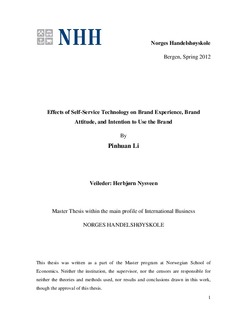| dc.description.abstract | The increasing popularity of adopting self-service technologies in every business field has attracted lots of attention and the emergence of self-service technology has also changed the traditional experience approach. Customer experience occurs whenever the customers interact with the company directly or indirectly. Previous studies have indicated that consumer interactions with the service personnel can greatly affect the service experience, however, little research has studied how the experience is affected when consumers interact with the technology.
To find out how the use of self-service technologies affects consumers’ perceptions on brand experience, their attitudes toward the brand and intentions to use the brand, the author designed a process model to predict the relationships among the antecedents, brand experience and the behavioral intentions. To test these relationships, quasi experimental settings and surveys were used to investigate respondents’ evaluations on two types of online services provided by Tryg. The results show that enjoyment is the key driver of brand experience in using the online service. In addition, ease of use, enjoyment, and self-efficacy can all significantly influence consumer’s attitudes toward using the brand. Brand experience also positively affects brand attitude and both of them are stong indicators of intentions to use the brand. Finally, the moderating effects of types of services are also analyzed and some differences are found across the services.
The current study has mainly contributed to provide the theoretical understanding to link the relationship between the use of self-service technology and brand experience. Additionally, it also provides evidences to brand managers on how to improve the brand experience when consumers choose to use the technology-based self-services and how to adapt the self-service technology interfaces across different types of services to increase the chance for adoptions. | no_NO |
